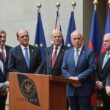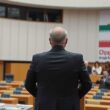A growing rift is emerging between the Evangelical Church in Germany (EKD) and a significant portion of its own constituency, fueled by accusations of political overreach and a perceived disconnect from the values of its members. Steffen Bilger, a prominent CDU politician and parliamentary group secretary for the Union, has publicly voiced concerns, alleging a growing sense of alienation amongst evangelical CDU members and broader church attendees.
Bilger’s remarks, published in “Focus” magazine, highlight what he describes as a “political slant” within the EKD that is increasingly viewed as unwelcome by many faithful. He suggested that a substantial number of churchgoers hold considerably more conservative viewpoints than the pronouncements and actions of church officials, demonstrating a divergence in perspectives that raises questions about the EKD’s representation of its members.
The criticism isn’t directed at the principle of the church engaging with political issues. Bilger acknowledged the legitimate role of religious institutions in commenting on public policy, but emphasized that such interventions must be rooted in a demonstrable connection to core Christian tenets. He implied that the EKD’s recent pronouncements have strayed from this foundation, fostering a sentiment of detachment amongst those it claims to represent.
The implications of this developing divide are significant. Beyond the immediate tensions within the EKD, the situation raises broader questions about the relationship between religious institutions and political discourse in Germany. It challenges the church to reassess its engagement and ensure it remains responsive to the views and values of its diverse membership, lest it risk further erosion of trust and relevance. The CDU’s critique signals a potential for political maneuvering, capitalizing on the dissatisfaction within a traditionally influential sector of German society.





